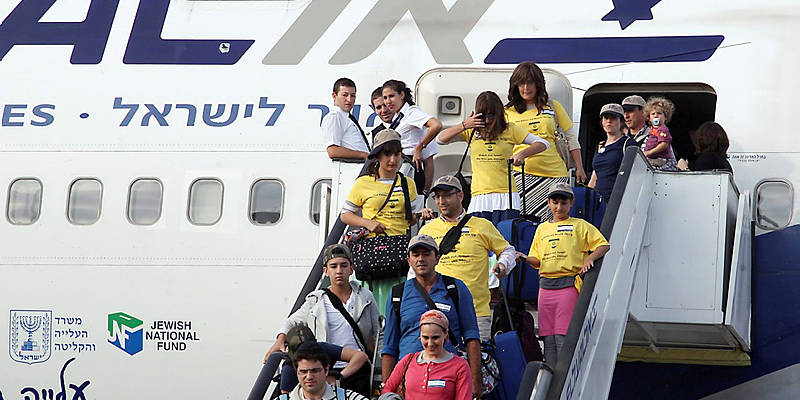Aliyah from around the world has reached a five-year high. Anti-Semitism and strife are main contributors to the significant growth.
Aliyah, immigration to Israel, has reached a five-year peak over the past year, according to data compiled by the Jewish Agency for Israel and the Ministry of Aliyah and Immigrant Absorption (MAIA).
During the year 5774 on the Hebrew calendar, which ended with the observance of Rosh Hashana, the Jewish New Year, 24,800 new immigrants have arrived in Israel. This represents a significant 28-percent increase compared to the 19,350 immigrants who arrived in Israel in 5773, and it is the highest number in the past five years.
Main Catalysts – Anti-Semitism and War
Aliyah from France has more than doubled, from 2,650 in 5773 to approximately 6,000 in 5774, marking the first time in history that more immigrants arrived from France than from any other country. The Jewish Agency states that the 125-percent increase is due, in part, to new programs that they and the MAIA had developed to enable young French Jews to experience life in Israel, as well as joint efforts to ease the immigration and absorption process.
Another primary catalyst in the spike in Aliyah from France is the rabid anti-Semitism there. A report from 2013 authored by Prof. Dina Porat of Tel Aviv University shows that the highest number of anti-Semitic attacks in Europe during 2013 occurred in France. French Jews have expressed an intensified feeling that personal safety and communal well-being have been jeopardized, while 73 percent attribute the surge in violence to radical Islam.
The turmoil and strife in Ukraine have also contributed to the sharp increase in Aliyah. Some 4,200 new immigrants arrived in Israel from Ukraine, pointing to a 110-percent increase over the past year. The Jewish Agency and MAIA boosted their efforts to facilitate immigration from Ukraine since the breakout of the hostilities in the region and at times conducted emergency operations to extract Jews from the war zone.
Young and Professional
Of the immigrants who arrived in Israel in 5774, 60 percent are under the age of 35, and 37 percent are between the ages of 18 and 34. Thousands are young professionals came on specialized tracks developed by the Jewish Agency and MAIA.
Jerusalem, Tel Aviv, and Netanya topped the list of destinations for new immigrants during 5774. More than 2,500 new Israelis settled in each of these cities.
Year’s Final New Arrivals
The final 140 immigrants of the Jewish year arrived in Israel from Russia and Ukraine last Monday, just before the New Year. They were greeted at Ben-Gurion Airport by Minister of Aliyah and Immigrant Absorption Sofa Landver and Jewish Agency Chairman Natan Sharansky.
“The increase in immigration from the four corners of the globe even in a year in which our enemies tried to undermine our security and challenge Israel’s legitimacy demonstrates that Israel is a country that guarantees both the personal safety of its citizens and the future of the Jewish People. Every one of the tens of thousands of immigrants who arrived in Israel this year brings an end to 2,000 years of wandering,” Sharansky stated.
Reunited at Last
Alexandrina Zheludev, 18, immigrated to Israel from Ukraine a year ago with the Jewish Agency’s SELA (Students Before Parents) program. Her parents and brother were in the group that came on Monday, and she was at the airport to reunite with her family. They made Aliyah from the city of Lugansk in embattled eastern Ukraine. Her mother, 39-year-old Oksana, and her father, Viatscheslav, who celebrated his 41st birthday on the day of his arrival in Israel, immigrated with their 16-year-old son Artur.
They spent the past few weeks hiding in the cellar of their home due to the ongoing fighting and had lost contact with their daughter in Israel. She was deeply concerned about them and they were worried about her during the war with Gaza over the summer. Their reunion after a year of separation was very emotional and joyful, signifying a hopeful new beginning for the New Year.
Author: Aryeh Savir
Staff Writer, United with Israel
